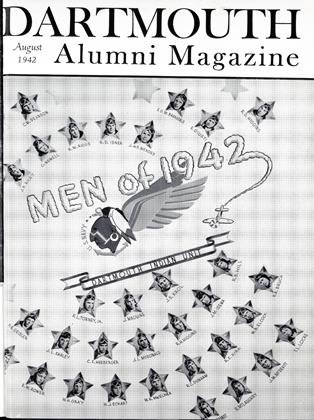CITIZENS ARE MORE FAMILIAR with the varied activities of the Office of Civilian Defense than is true of any other part of the war effort. Air raid wardens, in cities large and small, first aid recruits, Motor Corps Volunteers, personnel for rescue squads, auxiliary police, bomb squads, auxiliary firemen, fire watchers, demolition and clearance crews, road repair crews, decontamination squads, emergency food and housing corps, medical corps—all these vital units in the vast national program of civilian defense have the support and participation of millions of men, women and children.
John B. Martin '31 is executive assistant to OCD Director Landis. In replying to our inquiry on the most important aspects of civilian defense Mr. Martin says to Dartmouth people:
"A lot has been said about the fact that this is a total war and that civilians are as likely to be attacked as members of the military forces. But the real implications of total war have not yet been brought home to the country. It is not merely the likelihood of attack on civilians which makes this war different from other wars. It is the absolute necessity of a 100% civilian effort in support of the armed forces which is required if we are to match the forced labor and organized effort of the Axis countries.
"The Office of Civilian Defense has two tremendously important tasks. The first of these is to prepare the country for complete readiness in the event of an actual enemy attack from the air or otherwise. This in itself is a big job.
"It means repeated practice drills so that the protective side of civilian defense may operate smoothly when an actual attack comes. It means that Congress has had to appropriate many millions of dollars for the purchase of protective equipment and that a very difficult job of allocation and distribution of this equipment has to be carried out in order to put it in places where danger is greatest and where the need for protection from the military standpoint is most imperative.
"Finally, it means that once we are prepared and well drilled we may have to wait a long time before the organization which has been perfected is called into action. This creates a real problem because the average person finds action pleasant and inaction very tiresome.
"We are given the further task of mobiliz- ing the energies of the civilian population for the solution of the many community problems which arise as a result of the war. The urgency of this job is shown by the hundreds of letters which we receive from every part of the country written by persons who want to contribute to the job of winning the war. A sizeable percentage of the civilian population is now being drawn into the armed services. An additional large group is engaged in production. Approximately two million persons are now assigned to training or duty in the protective services of the Citizens Defense Corps.
"Over and beyond these groups there are many millions of persons, men, women and children, who must find a place for themselves in the war program. This is not an easy job and it will take time to complete but no one in this country today dares say to the civilian population, 'This is not your war. Let the Army or the Navy do the job.' This is everyone's war and everyone must be enlisted whether he wears a uniform or not.
"There may be a transportation problem resulting from rubber and gas shortages which must be solved if workers are to get to and from their jobs as they should. There may be a housing problem which must be met if the efforts of the community are to go on at full speed. There may be a child care problem created by the fact that women will be increasingly swept into factories by the production drive. There are problems of race relations which must be solved in the interest of unity in the war effort. There may be a problem of making those individuals who are subject to call by the Army ready for better Army service through some form of pre-induction training, military and physical. There will be problems of rationing, problems of conservation, problems of making the many groups of which each community is composed feel that they are not left outside the war program.
"This is just a beginning of the list of things which people in this country must set themselves to do if we are to give the lie to the Axis propaganda that democracies are ineffective and inefficient. At the same time this is the greatest opportunity which this country has ever had to demonstrate that democracy is not just a word but a living and a vital force which springs out of the conviction that a free nation is a strong nation."
It is in terms of this challenge to the great body of volunteers for civilian war service, in cities and communities, large and small, that the vital work of national defense and postwar reconstruction must be handled. Although this article discusses all aspects of war service, the emphasis is placed for the largest number of people on the work of civilian defense.
JOHN B. MARTIN 'GI Former editor-in-chief of "The Dart-mouth" who is executive assistant to Di-rector Landis, Office of Civilian Defense.
 View Full Issue
View Full Issue














